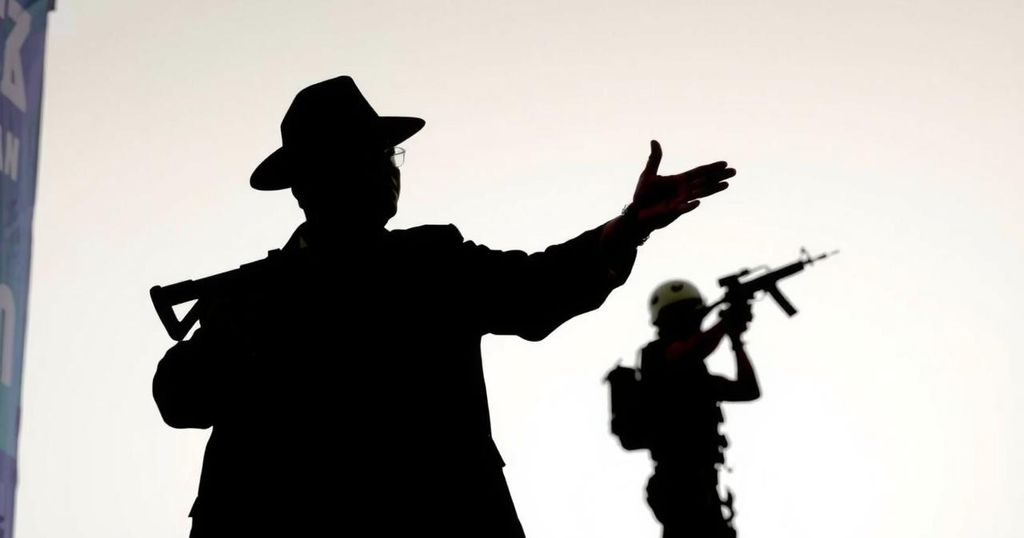The President of the Dominican Republic, Luis Abinader, warned of possible “drastic measures” in response to the failure of a U.N.-backed mission in Haiti to combat gang violence. With gangs controlling 80% of Port-au-Prince, the Dominican administration expresses concern over the humanitarian crisis spilling into the Dominican Republic, which has deported over 170,000 individuals believed to be Haitian. Abinader emphasized the need for successful intervention to establish conditions for elections in Haiti and improve regional stability.
In a pressing address at the United Nations General Assembly in New York, the President of the Dominican Republic, Luis Abinader, issued a stark warning regarding the potential consequences of a United Nations (U.N.)-backed anti-gang mission in Haiti. He emphasized that should the mission, which aims to combat rampant gang violence, falter, his administration would resort to “drastic measures” to safeguard the Dominican Republic. The president provided no specifics on the actions he might pursue but articulated grave concerns over the deteriorating situation in Haiti, where gangs currently exert control over 80% of the capital, Port-au-Prince. This escalation in violence has driven hundreds of thousands of Haitians from their homes and presented significant challenges for the Dominican Republic, which shares the island of Hispaniola with Haiti. President Abinader acknowledged the contributions of Kenya, which leads the anti-gang mission with nearly 400 police personnel, complemented by forces from Jamaica and Belize. He underscored the insufficiency of these numbers against an anticipated deployment of 2,500 troops from various nations. He asserted that the mission must be properly established to create conditions for the long-overdue elections in Haiti, which have not been held since 2016. Abinader lamented the current lack of progress, noting that “practically one year from the holding of elections, the conditions are still not in place to do so.” The president highlighted the impact of the Haitian crisis on the Dominican Republic’s stability, stating that instability in Haiti had inflicted considerable strain on Dominican security. He relayed the statistic that last year, 10% of medical appointments in the Dominican Republic were undertaken by Haitians, and remarked upon the significant presence of Haitian minors in the nation’s educational system. Moreover, he disclosed that his administration had deported over 170,000 individuals presumed to be Haitian last year, while some estimates suggest the actual figure exceeds 224,000. Despite accusations from activists regarding human rights violations against Haitians in the Dominican Republic, Abinader reiterated his administration’s commitment to human rights, stating, “the Dominican government is profoundly committed to protecting human rights.” In his speech, Abinader also pointed out positive developments within the Dominican Republic, noting a historic low poverty rate of 19% and a reduction in the national murder rate to 10 per 100,000 inhabitants, down from 13 in the previous year. As the speech concluded, Edgard Leblanc Fils, the president of Haiti’s transitional presidential council, is expected to address the U.N. on Thursday, yet no immediate response was available from Haitian officials following Abinader’s speech.
The Dominican Republic shares the island of Hispaniola with Haiti, which has struggled with gang violence, political instability, and economic decline, particularly after the assassination of President Jovenel Moïse in July 2021. The rise of gangs in Haiti has created a humanitarian crisis, driving many to flee to the Dominican Republic, thereby straining resources and intensifying security concerns. The U.N.-backed mission aims to restore order and facilitate elections in Haiti, which have been stagnant since 2016, but concerns over insufficient funding and troop contributions persist. The Dominican Republic faces significant challenges in managing the repercussions of the instability in its neighboring country. President Abinader’s administration has been engaged in controversial deportation policies towards Haitian immigrants, leading to criticism from human rights advocates. Despite these tensions, Abinader notably points to improvements in domestic economics and security as evidence of his administration’s effectiveness.
In summary, President Luis Abinader of the Dominican Republic has voiced serious concerns regarding the potential failure of a U.N.-backed mission in neighboring Haiti aimed at curbing gang violence. With gangs controlling vast areas of Port-au-Prince and posing a threat to regional stability, Abinader signaled potential drastic actions should the mission falter. His remarks highlight the intertwined fates of Haiti and the Dominican Republic, where Haitian instability has brought about significant challenges, including humanitarian pressures and security issues. While reaffirming his government’s commitment to human rights, he simultaneously noted substantial achievements in combating his country’s own poverty and violence.
Original Source: apnews.com







